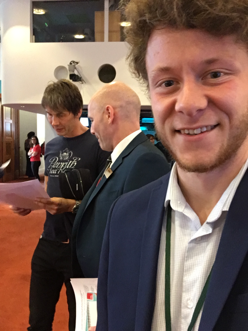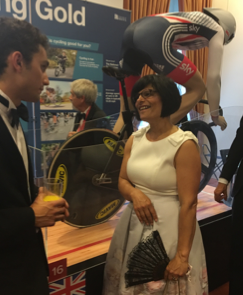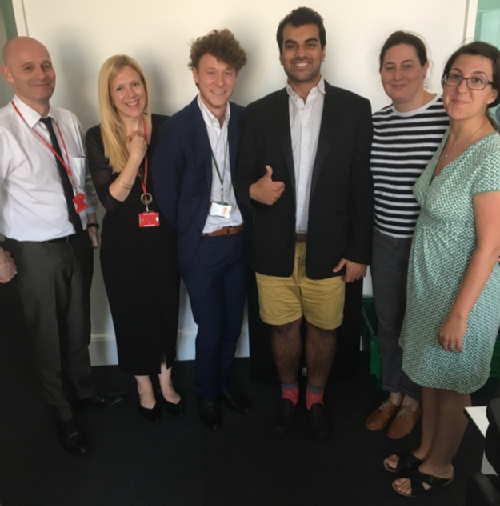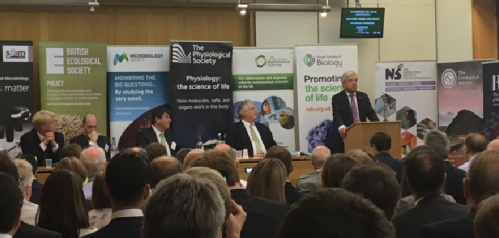All entries for Wednesday 26 July 2017
July 26, 2017
Parliamentary Links day and my time at the Royal Society
I had the privilege as part of the Public Affairs team to attend the Annual Links day (27thJune 2017) event in Parliament. As a three moth Intern within the team, this chance was a wonderful opportunity to see the collaborations and discussions between the learned societies and government centred on science. This filled me with hopes for the future as I am currently a PhD student studying Cancer sciences at the University of Birmingham, funded by the BBSRC.
The topic of this year’s Links day was: UK Science and Global Opportunities. The location, the Attlee Suite Portcullis House, a wonderful building within the parliamentary complex at Westminster. After the formalities of coffee, the cohort of attendees was ushered into a very packed room with people lining the side walls and back area around the seating. This is to the credit of the hard work of Stephan Metcalfe MP and Stephan Benn of the Royal Society of Biology for bringing together such a wealth of knowledge and people.
I settled down from the initial buzz of seeing the speaker of the House of Commons, the Rt Hon John Bercow MP and Jo Johnson MP to listen to their commitments to science and it placed reassurances to everyone in the room. John shared that he in fact did not take any science O-levels and that his knowledge was limited, but since becoming speaker, was a great advocate of science. John also spoke of his absolute fondness for the late Tony Benn and thanked the Benn family for their dedication and hard work to the field of science. In the welcome talks, Sir John Kingman FRS, the chair designate of UKRI, made it clear that the political class is recognising that science is the future. He also stated that the ability to navigate Brexit is crucial, with the attempt to remain in the Horizon 2020 and to maintain overall European funding. Jo Johnson MP importantly revealed that the UK will continue collaboration with Joint European Torus (JET), a fusion energy centred in the UK. This was much to the delight of Institute of Physics I’m sure. Jo also eluded to the government’s pledge to reach the OECD average on R&D spending within the next decade, a statement I have repeated many times since the manifesto reveal, with the hope that one day it might actually be carried out!
At this point my feet got very tired from the prolonged standing so I decided to take a seat on the floor for the panel discussions. Within these, the multiple academics, MPs and scientists focused on the current topical issue of Brexit, one year on from the historic vote. Each person raised concerns on EU nationals, immigration, funding and programme participation. Chris Hale, from Universities UK, and the president of the Royal Society of Edinburgh called to remove students from immigration numbers as a special consideration to their circumstances. Representatives from both the Embassy of Spain and Italy presented worrying and quite frankly shocking statistics. A study conducted with 2,000 Italian academics said that 82% have thought about leaving or are planning to leave the UK. Overall, the consensus was that there is a lack of knowledge on the framework of the government’s stance on immigration. It’s obvious that more clarity is needed over the coming months. Chi Onwurah MP, stated a need for a free flow of ideas and people and Dr Sarah Main, the director of CaSE insisted the community has to come together. It was incredibly warming to see such a unified voice on science and the priorities of science in Brexit. This positive and optimistic outlook on the role of science in the future should please the audience although it’s clear to notice that continued pressure and collaboration is essential.
Professor Alex Halliday, Vice president of the Royal Society was given the great honour of providing at keynote address during a very lavish dinner in the Cholmondeley Room of the House of Lords. Within the speech, Alex was able to provide the audience with three main stances the Royal Society have on Brexit. The first is to provide certainty for EEA citizens currently residing in the UK. He then followed with a new priority for the Royal Society, to remove international students from the immigration figures as they provide £25bn to the economy, as well as the diversity of ideas and people. The final point stated that the country should participate in Horizon 2020 until the end of the programme, as part of any phased exit from the EU.
During this five-course lunch, I got to sit on the table of The Council for the Mathematical sciences and I spoke about gender inequalities in STEM subjects with Sir Adrian Smith FRS, University of London’s vice-chancellor and about the surging youth support for Labour with Stephen Timms MP. Professor Chris Linton, Provost and Deputy Vice-Chancellor of Loughborough University discussed in detail about the new London-based campus for the university which I previously was unaware of.
Getting the chance to rub shoulders with such an esteemed group of people was a nice break from my work on the Royal Society’s annual Summer Science Exhibition. This event marks the last week of my time at the institution and has been the main focus of my work in the Public Affairs team. I was tasked by Becky and Joe to invite MPs to the event that within their constituency, holds one of the institutions taking part in the 22 exhibits. In doing so I have communicated with the lead researchers of the exhibits, mailed and maintained contact with around 30 MPs, created a press release for the attending MP’s, organised the photography and created briefings on both the researchers and MPs. With the general election being called so close to the event and the change in MP’s, this became a challenging and tall order on a very tight schedule. I hold the Summer Science Exhibition close to my heart and I am very proud of the important role I have played. Overall, I have loved the fast paced environment and the office life, but most of all I am hugely grateful to the Public Affairs team for having me, what a great bunch of excitable, but professional people they are! It’s been an honour and pleasure and I hope to return in the future.




Picture 1: Meeting Brian Cox at the Summer Science Exhibition. Picture 2: Thangam Debbonaire MP for Bristol West at the Cycling Glory stand.Picture 3: The Public Affairs team at the Royal Society Picture 4: Parliamentary LINKS day (27thJune 2017) with Jo Johnson MP, Stephan Metcalfe MP, Stephan Benn and the Rt Hon John Bercow MP
Curtis Oliver-Smith - MIBTP 2016
June 2017
MIBTP Teambuilding in Coniston

As part of the MIBTP doctoral training programme we are fortunate to have access to the University of Birmingham’s activity centre in the Lake District; the Raymond Priestly Centre. It is perfectly located on the western shore of Coniston Water surrounded by stunning views of the lake and mountains which look beautiful, even in the rain!
For many people, the idea of “team building activities” during a PhD may seem a waste of time. I have to admit that the thought of taking 5 days out of my research schedule to play in a canoe or climb some ropes did not fill me with joy as we set off up the M6 in the middle of June. However, I could not have enjoyed my time at the Raymond Priestly Centre more!
Everyone in my group seemed a little sceptical at first, being instructed to build a bridge over a marshy pit or canoeing across a lake weren’t tasks we thought we would need to do while completing a PhD! However, we dived into the tasks in good spirits laying planks of wood, shuffling across platforms, lifting each other through small space between strings, building rafts. Little did we know that so much learning could be obtained from such fun activities. We started each task with little planning initially and consequently little success! However, with guidance from the delightful team leaders from the Centre, we realised the importance of collaborating our ideas and deciding upon the best way to complete the activity.
Throughout the week at the centre there were reflective discussion about how we had completed the tasks (if indeed we had managed to!) and on the groups teamwork each day. Again, if I’m honest, I was sighing at the words “reflective activity” written into the timetable for each day at the centre, however it is a lot more beneficial than you would first expect. Looking back at how you tackled each task at the end of an activity, with the leaders instigating a thought process on what could be improved and what went well, provided useful feedback to enhance our team-working skills each day. Eventually we established roles for each of our group members based upon each other’s strengths. It was clear to see how we all developed over the week when you compare our epic failures of plunging into marsh pits and capsizing canoes initially, due to rushing into activities without proper planning at the start of the week, to our team navigating across the lake and mountains of Coniston on the last day successfully collecting many points for Project X. The way our group transitioned from many individuals, each with good ideas and skills to offer, into a prosperous team was as a result of our group reflection and feedback session.
Teamwork, feedback and reflection are all skills that are important in the lab setting and throughout a PhD. With each experiment conducted, a plan needs to be established from start to finish and often made in collaboration with supervisors or other lab members. Utilising people’s skills and strengths and working together with your lab group is important to help you learn and develop into a successful researcher. Being able to work well in a team during your PhD is incredibly beneficial, although, if your experimental results don’t turn out exactly as planned at least you don’t end up in a cold lake or covered in mud!
My time at Coniston gave me the opportunity to get to know my MIBTP colleagues more and have a great time in the Lake District. But more than simply this, it offered me the chance to reflect on my PhD and myself as a researcher. I had never really stopped to consider what I was doing well or what I needed to work on and plan how to tackle any issues I identified. While at the Raymond Priestly Centre I learnt a lot about myself, but also had an incredible time in an amazing setting. I was completely converted from a cynic of teambuilding events to wishing I could go again next year! I hope you can enjoy your time in Coniston as much as I did!
Sophie Martucci - 2015 cohort
June 2017
 Kerry Davies
Kerry Davies

 Please wait - comments are loading
Please wait - comments are loading
 Loading…
Loading…